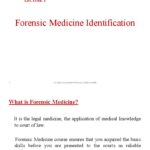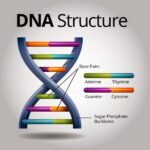Forensic science, a discipline captivating minds across the globe, extends far beyond the dramatic portrayals often seen in popular media. The fascination stems not only from the intricate puzzle-solving aspect of crime investigation but also from the desire to understand the “how” and “why” behind transgressions against societal norms. While many are familiar with basic crime scene investigation, the reality is that forensic science encompasses a diverse range of specialized fields, each playing a crucial role in the pursuit of justice. Let’s delve into some of the most prominent branches of this intricate science.
Forensic Pathology: Unraveling the Mysteries of Death
Forensic pathology, perhaps one of the most recognized subspecialties, focuses on determining the cause and manner of death. A forensic pathologist, a medical doctor specializing in this area, meticulously examines the deceased, conducting autopsies to identify injuries, diseases, or other factors that may have contributed to the individual’s demise. They are the ultimate arbiters in distinguishing between natural causes, accidents, suicides, and homicides. This determination holds immense weight in subsequent legal proceedings.
The work extends beyond the autopsy table. Pathologists analyze microscopic tissue samples (histopathology), perform toxicology tests to detect drugs or poisons, and collaborate with other forensic specialists to reconstruct the events leading to death. Their expert testimony is vital in court, where they explain complex medical findings in a clear and understandable manner. The pathologist’s role is not just about identifying the immediate cause of death, it’s about uncovering the sequence of events and contributing factors that led to it.
Forensic Toxicology: Detecting Poisons and Drugs
Closely linked to pathology, forensic toxicology concentrates on identifying and quantifying drugs, poisons, and other chemical substances in bodily fluids and tissues. Toxicologists employ sophisticated analytical techniques, such as gas chromatography-mass spectrometry (GC-MS) and high-performance liquid chromatography (HPLC), to detect even trace amounts of these substances. The information gleaned from these analyses can reveal whether a person was under the influence of drugs or alcohol at the time of an incident, or whether they were poisoned, intentionally or accidentally.
Toxicologists play a crucial role in a variety of investigations, from suspected drug overdoses to cases of poisoning and even vehicular accidents. Their findings can provide crucial evidence in criminal trials and civil lawsuits, helping to establish liability and determine the circumstances surrounding an incident. The interpretation of toxicological results requires a deep understanding of pharmacology and toxicology, as well as the effects of different substances on the human body.
Forensic Anthropology: Giving Voice to the Silent
When skeletal remains are discovered, whether from a recent crime or an historical context, forensic anthropologists are called upon to analyze them. These specialists use their knowledge of human osteology (the study of bones) to identify the deceased, determine their age, sex, ancestry, and stature, and even identify any trauma or disease they may have suffered during their lifetime. Analyzing bone fractures, healed injuries, and dental characteristics can provide valuable clues about the individual’s identity and past.
Forensic anthropologists often work in collaboration with archaeologists and other forensic specialists to excavate and analyze skeletal remains from crime scenes or mass graves. Their work can be particularly crucial in identifying victims of mass disasters, war crimes, or genocide. Through careful analysis and meticulous documentation, these specialists give a voice to the silent, helping to bring closure to families and justice to the deceased.
Forensic Entomology: Insects as Silent Witnesses
Forensic entomology, a seemingly unconventional but highly valuable field, utilizes the study of insects to estimate the time of death (post-mortem interval, or PMI). Different insect species colonize a body at different stages of decomposition, and the developmental rates of these insects are influenced by environmental factors such as temperature and humidity. By analyzing the insect species present on a body, and their developmental stages, forensic entomologists can provide a relatively accurate estimate of how long the individual has been deceased.
Entomologists also assist in determining whether a body has been moved from one location to another after death. They can analyze the insect species present on the body and compare them to the insect populations in the surrounding environment to determine if there are any discrepancies. This information can be vital in reconstructing the events leading to death and identifying potential crime scenes. The field is a symphony of meticulous observation and nuanced biological understanding.
Forensic Psychology and Psychiatry: Exploring the Criminal Mind
Forensic psychology and psychiatry delve into the psychological and psychiatric aspects of criminal behavior. Forensic psychologists assess the mental state of defendants, determine their competency to stand trial, and provide expert testimony on issues such as diminished capacity and insanity. They may also conduct risk assessments to determine the likelihood of future violence or re-offending. Forensic psychiatrists, on the other hand, are medical doctors who specialize in diagnosing and treating mental illnesses in the context of the legal system. They evaluate defendants for mental disorders that may have contributed to their criminal behavior and provide expert testimony on the impact of mental illness on criminal responsibility.
These professionals play a crucial role in the criminal justice system, helping to ensure that defendants are treated fairly and that the public is protected from dangerous individuals. Their insights into the criminal mind can provide valuable information for investigators, prosecutors, and judges, helping them to understand the motivations behind criminal behavior and to make informed decisions about sentencing and treatment.
Digital Forensics: Unearthing Evidence in the Digital Realm
In today’s digital age, digital forensics has become an increasingly important branch of forensic science. Digital forensic specialists recover and analyze data from computers, smartphones, and other digital devices to uncover evidence of criminal activity. They may recover deleted files, analyze internet browsing history, and track email communications to identify suspects, establish timelines, and gather evidence to support a prosecution. The field is becoming increasingly critical in the wake of cybercrimes.
Digital forensic specialists use a variety of specialized tools and techniques to recover and analyze digital evidence, including imaging software, data recovery tools, and network analysis tools. Their work requires a deep understanding of computer hardware, software, and networking protocols, as well as a strong ethical commitment to maintaining the integrity of the evidence. As technology continues to evolve, digital forensics will undoubtedly remain a critical component of criminal investigations.
Other Specialized Areas: A Tapestry of Expertise
Beyond these core areas, numerous other specialized branches of forensic science contribute to the pursuit of justice. These include forensic odontology (dentistry), which involves identifying individuals through dental records and bite mark analysis; forensic engineering, which investigates structural failures and accidents; and forensic botany, which utilizes plant evidence to link suspects to crime scenes. The sheer breadth of the field underscores the complex and multifaceted nature of criminal investigation. It’s a collaborative endeavor, where diverse expertise converges to piece together the fragments of truth.
The allure of forensic science resides in its unwavering commitment to scientific rigor and its application to real-world problems. It represents a confluence of knowledge, skill, and dedication, all aimed at uncovering the truth and ensuring justice prevails. The diversity within the field ensures that there’s a place for every scientific discipline, from biology to chemistry to computer science, to contribute to the complex puzzle of crime investigation.









Leave a Comment